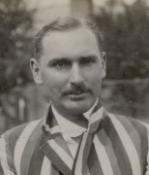
War Memorial
| 2nd Lieutenant Albert John HOLMES | |
|
Royal Field Artillery Date of birth: 30th June 1899 Date of death: 21st May 1950 Died aged 50 Unknown |

|
| Albert John "Jack" Holmes was born at "Alnwick", Norfolk Road, Thornton Heath in Surrey on the 30th of June 1899 the eldest son of Albert Arundel Holmes, a farmer and Lloyd's Underwriter, and Ellen (nee Lambard) Holmes later of Northiam Place, Northiam in East Sussex. He was educated at Hazelwood School until July 1913 where he was a member of the Cricket XI in 1909, 1910, 1911, 1912 and 1913 when he was Captain in the latter two years. He was a member of the Football XI in 1909, 1910, 1911, and 1912 serving as Captain in the latter two years. The school magazine wrote the following on his 1909 cricket season: - "A grand and plucky field. Is very young and will make a bat someday." Of his 1910 cricket season they wrote: - "Is as safe as ever in the field and has added smartness; begins to show an aptitude for bowling, but his batting is still strangely unsuccessful." They wrote of his 1911 cricket season: - "Came on much as a bat but too full of nerves to do himself justice; a very puzzling bowler with a slow, dropping ball round the wicket; good field." Of his 1912 cricket season they wrote: - "Invaluable as leader; his batting has improved out of recognition; bowls with much "head" and is brilliant in the field." They wrote of his 1913 cricket season: - (Captain) - Perhaps the finest all round cricketer Hazelwood has ever turned out. A very fine and powerful bat, quite sound in method. A tireless and resourceful bowler, and splendid field at cover - or anywhere. Above all, an impartial and strict captain with a wonderful knowledge of the game, and an extraordinary influence over the members of his team." They wrote the following of his 1909 football season: - "(Right half) - Very sturdy in defence, though rather slow; must learn to kick with the instep instead of the side of his boot." Of his 1910 football season they wrote: - "(Full back) - A defender of the slow but sure type; has improved his tackling, and should next season be of the greatest service." They wrote of his 1911 football season: - "(Captain) (Left back) - A tower of strength to the side; has imbibed quite well an intelligent appreciation of the game; not a very clever kicker, but a good header and superb tackler; failure to realise that incessant tussles and collisions entail deterioration in his play." Of his 1912 football season they wrote: - "(Back) - A splendid captain, whose value to his side it is impossible to overestimate; kicks strongly with either foot, is a sound tackler, and has a thorough knowledge of the game; he is perhaps lacking in pace, but for all that should someday make a name for himself in the "Soccer" world." On leaving the school the magazine wrote of him: - "These pages bear witness to Holmes's abilities on the cricket field, of his equal skill on the football field we all know. We wish now to place on record our admiration of his unusual strength of character both in the class room and out of it, and of the influence for good which he wielded among the other boys. We can never show our gratitude to him adequately enough. Holmes takes with him to Repton the knowledge that everyone at Hazelwood loved and respected him." He went on to Repton School where he was in Cross House from September 1913 to December 1917. He was appointed as Vice Captain of the Football XI in 1915 and as Captain in 1916 and was appointed as a Prefect in 1916. During 1917 he was taken dangerously ill with a virulent strain of measles and spent some time recuperating at Bournemouth. He applied for a commission and joined the Officer Cadet Battalion (Royal Field Artillery) at Weedon in January 1918 and was commissioned as a 2nd Lieutenant in the Royal Field Artillery on the 16th of September 1918. He disembarked for service in France on the 7th of November 1918. Following a period with the army of occupation, he was demobilised in May 1919. In October 1919 he went to Hertford College Oxford but gave up university life without graduating. He sailed for South Africa on the 5th of March 1920, returning later that year to take a teaching position at Highfield Preparatory School at Liphook in Hampshire. He was married at St John’s Church, Upper St Leonards to Rosa (nee Reay) on the 6th of April 1921 which was followed by a reception at the Albany Hotel and a honeymoon at the Swiss-Italian lakes; they had a daughter, Gwendolen R., born on the 24th of January 1922, a son, John R.R., born on the 7th of April 1924 and another daughter, Pamela J., born on the 6th of April 1926. In 1922 he accepted a post as a schoolmaster at Chelmsford School, Eastbourne. A keen club cricketer, he had a successful trial for Sussex in the summer of 1922 and played for the county in 1923 scoring his first century in the last game of the season. He rejoined the service on a short service commission and was commissioned as a Pilot Officer on probation in the Royal Air Force on the 17th of January 1925. He was confirmed in his rank on the 17th of July 1925. During his time in the service he flew Avro, Sopwith Snipe and SE5 aircraft and served for a time with the Army Co-Operation Service. He passed Exam B in February 1929. He left the service on the 17th of January 1935 and passed into the Royal Air Force Reserve of Officers with the rank of Flight Lieutenant. He resumed his cricket career with Sussex until 1939, becoming captain and appearing at Lords for the Royal Air Force against the Royal Navy. During his first class career he scored 6,282 runs at an average of 21.22 and was a member of the Test Match Selection Committee in 1939 as well as being the manager of the MCC team which toured South Africa in 1938/9. He played his last first class match for Sussex against Yorkshire from the 30th of August to the 1st of September 1939, which was the last game to be played before cricket was suspended on the outbreak of war. He was mobilised on the outbreak of the Second World War as an instructor at the Central Flying School and was promoted to Squadron Leader on the 1st of March 1940. He was promoted to temporary Wing Commander on the 1st of March 1942 and was confirmed in his rank on the 10th of September 1942. He was awarded the Air Force Cross in October 1940, which was announced in the London Gazette of the 11th of October 1940, and a Bar on the 31st of March 1942. At the end of the war he became Chairman of Selectors for four years but resigned in 1950 on the advice of his doctor. He was later a pioneer of mink farming in the UK. His father, Captain Albert Arundel Holmes 2/5th (Cinque Ports) Battalion Royal Sussex Regiment, died on the 19th of May 1915. He died of a heart attack at his home at Burwash in Sussex. |
|
 | |
| Went on to Repton School |
Back